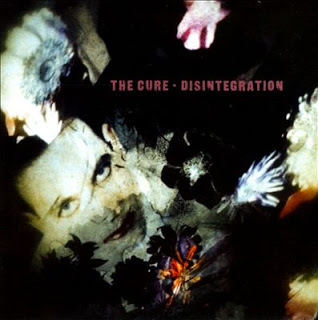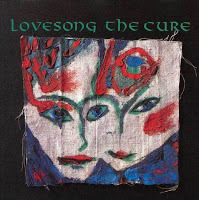The Cure - Disintegration
 In the same way that Fun's "We Are Young" isn't about being young, The Great Gatsby isn't about the recklessness of youth, but the recklessness at the end of youth; it's less about pursuing the dream than when dreams begins to fray. The moment that Gatsby has Daisy in his grasp is the moment when the green light - the symbol of his youthful desires - loses its luster: "His count of enchanted objects had diminished by one," Nick Carraway croons, with the dread promise of more to follow. The members of Fun had turned 30 when they sang "We Are Young," as had Nick at the novel's climax: "I was thirty. Before me stretched the portentous, menacing road of a new decade... Thirty - the promise of a decade of loneliness, a thinning list of single men to know, a thinning brief-case of enthusiasm, thinning hair." That's about as brutal a sentences as any 30-year-old can stand. Similarly, The Cure's Disintegration was conceived during the annus horribilis of Robert Smith. In April 1988 he'd hit 29, and was depressed and obsessed with delivering a "masterpiece" before the big 3-0.
In the same way that Fun's "We Are Young" isn't about being young, The Great Gatsby isn't about the recklessness of youth, but the recklessness at the end of youth; it's less about pursuing the dream than when dreams begins to fray. The moment that Gatsby has Daisy in his grasp is the moment when the green light - the symbol of his youthful desires - loses its luster: "His count of enchanted objects had diminished by one," Nick Carraway croons, with the dread promise of more to follow. The members of Fun had turned 30 when they sang "We Are Young," as had Nick at the novel's climax: "I was thirty. Before me stretched the portentous, menacing road of a new decade... Thirty - the promise of a decade of loneliness, a thinning list of single men to know, a thinning brief-case of enthusiasm, thinning hair." That's about as brutal a sentences as any 30-year-old can stand. Similarly, The Cure's Disintegration was conceived during the annus horribilis of Robert Smith. In April 1988 he'd hit 29, and was depressed and obsessed with delivering a "masterpiece" before the big 3-0.  In some ways, Smith's despondency was at odds with the The Cure's status as a globally-renowned alternative rock band. Their previous LP, 1987's poppy though melancholy Kiss Me, Kiss Me, Kiss Me was a celebration of the band's first decade and helped The Cure crack mainstream America, the ultimate prize. Robert Smith, however, was not a happy puppy. Believing that most bands delivered their masterpiece by the time they were thirty, he set about writing "the most intense thing The Cure have ever done." In many ways, Disintegration was the prototype of a Robert Smith solo album. "I would have been quite happy to make those songs on my own, if that band hadn't liked them."
In some ways, Smith's despondency was at odds with the The Cure's status as a globally-renowned alternative rock band. Their previous LP, 1987's poppy though melancholy Kiss Me, Kiss Me, Kiss Me was a celebration of the band's first decade and helped The Cure crack mainstream America, the ultimate prize. Robert Smith, however, was not a happy puppy. Believing that most bands delivered their masterpiece by the time they were thirty, he set about writing "the most intense thing The Cure have ever done." In many ways, Disintegration was the prototype of a Robert Smith solo album. "I would have been quite happy to make those songs on my own, if that band hadn't liked them." The atmosphere around him was particularly toxic. Smith was in a depressed, non-communicative state ("one of my non-talking modes"), as he fretted over creating an LP that contained the doom-laden gravitas of 1982's brilliant Pornography. "I actually wanted an environment that was unpleasant," he recalled, and a combination of his own truculence and keyboard player Lol Tolhurst's raging alcoholism ensured that the creation of Disintegration was a miserable experience. (Smith was concerned that his old school friend would steadily drink himself to death, and despite Tolhurst attending a brief stint in rehab, things came to a head during a mixing session for Disintegration at RAK Studios in London, during which Smith and a drunk Tolhurst had a stormy exchange, Lol expressing his oblique dissatisfaction with the LP.)
Tolhurst was sacked in February 1989 and replaced by Roger O'Donnell, a more proficient keyboardist whose cinematic use of "walls of synthesizers" would become the cornerstone of the record's dense, cakey feel, from the Gothic funeral/wedding march in the opening mood-setter "Plainsong," onward.
 The LP's first single, "Lullaby," is perfectly twisted pop for which Smith took inspiration from creepy lullabies his own father sang to him. The song's video, directed by Tim Pope, is an arachnophobic vision of hell in which Smith is eaten by a giant spider. Yep, quite the lullaby.
The LP's first single, "Lullaby," is perfectly twisted pop for which Smith took inspiration from creepy lullabies his own father sang to him. The song's video, directed by Tim Pope, is an arachnophobic vision of hell in which Smith is eaten by a giant spider. Yep, quite the lullaby. Visceral self-flagellation is at the core of Disintegration. The dense "Closedown" is a laundry list of personality failings, while the portentous "Last Dance" aches with memories of fleeting happiness. Even the pristine "Pictures Of You" – a positively upbeat ditty (relative of course to the surrounding gloom) – saw Smith chiding himself about failed relationships ("If only I'd thought of the right words/ I could have held onto your heart"), and while his desire to torment himself via lyrics wasn't a new concept, Disintegration saw Smith perfect the craft of self-mutilation.
Amid the turmoil, though, is a moment of redemption. "Lovesong" is indeed a straight up love song that Smith wrote to his wife, Mary Poole. The couple married in August 1988, and the song was a wedding gift. "I couldn't think of what to give her," Smith would later (half) joke about a song that sounded at odds with the rest of the album. "It took me ten years to get to the point where I felt comfortable singing a straightforward love song." Yet even "Lovesong" revealed the scars that fueled Disintegration, the obsession of approaching 30 ("Whenever I'm alone with you / You make me feel like I am young again.").

While The Cure's American record label (Elektra) hated Disintegration on first listen ("There was just this look of absolute dismay on their faces," Smith confirmed), the album was a worldwide hit. Selling in excess of 3 million copies, Disintegration ensured that despite Smith's best efforts The Cure had "become everything I didn't want us to become - a stadium rock band." And a miserable stadium rock band at that. Chris Roberts' glowing Melody Maker review offered up a perplexing conundrum: "How can a group this disturbing and depressing be so popular?" Pretty easily, if the truth be known, and Roberts needn't have looked further than the peerless title track. Clocking in at eight-and-a-half minutes, "Disintegration" is a sprawling, reeling act of desperation, on which Smith unlocked a Pandora's Box of self-loathing. "I miss the kiss of treachery/ The shameless kiss of vanity," he begins before lurching into "I never said I would stay to the end/ I knew I would leave you with babies and everything," a line I always felt particularly harsh on his newlywed status. By the song's heart stopping crescendo, the singer seemed to be bumping along rock bottom as he screams, "Now that I know that I'm breaking to pieces/ I'll pull out my heart and feed it to anyone."
My mother was a back-up singer for the likes of Burt Bacharach and Ray Conniff, and so music was a constant in our lives. I recall having an 8-track player in our Ford Falcon and my mother playing only one side of People by Barbra Streisand. The title song was on Side 4 with "Love is a Bore" and "Don't Like Goodbyes" (an unusual Harold Arlen song with lyrics by Truman Capote). My mother would skip sides 1-3 and we'd listen to Side 4 over and over, just so that she could sing "People." It wasn't long afterwards that she got a new old car with a cassette, and she'd play "People" and rewind and say, "Listen to this part." It was when I realized the power of rewind; it was when I realized that little bits of songs, snippets of melody or vocals, could have such an impact. Since then I've listened to music that way: rewinding. Disintegration is that album on which every rewind reveals something new, something unexpected or something else sublime, about People.
Published on May 26, 2018 05:29
No comments have been added yet.



